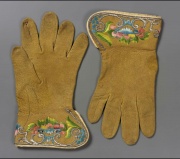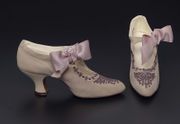Difference between revisions of "Suede leather"
Jump to navigation
Jump to search
| Line 4: | Line 4: | ||
A [[leather|leather]] finished with a raised nap or pile. The nap on most suede is produced by buffing or abrading the flesh side or split side of leather; the exception is for velvet suede which is produced from the grain side. Good suede has an even nap with dense fibers of a uniform length. It is usually oiled to make it supple but not greasy. In general, velvet suedes are finer than flesh suedes; young animals (kid and calf) also give finer suedes. Suede is not as durable as high quality leather. | A [[leather|leather]] finished with a raised nap or pile. The nap on most suede is produced by buffing or abrading the flesh side or split side of leather; the exception is for velvet suede which is produced from the grain side. Good suede has an even nap with dense fibers of a uniform length. It is usually oiled to make it supple but not greasy. In general, velvet suedes are finer than flesh suedes; young animals (kid and calf) also give finer suedes. Suede is not as durable as high quality leather. | ||
| − | + | [[File:Suede shoes.jpg|thumb|Suede shoes<br>MFA# 53.1064]] | |
| − | |||
== Synonyms and Related Terms == | == Synonyms and Related Terms == | ||
Latest revision as of 12:50, 17 August 2020
Description
A Leather finished with a raised nap or pile. The nap on most suede is produced by buffing or abrading the flesh side or split side of leather; the exception is for velvet suede which is produced from the grain side. Good suede has an even nap with dense fibers of a uniform length. It is usually oiled to make it supple but not greasy. In general, velvet suedes are finer than flesh suedes; young animals (kid and calf) also give finer suedes. Suede is not as durable as high quality leather.
Synonyms and Related Terms
ante (Esp.); pele acamurçada (Port.); mocka (Sven.); suede calf; suede kid; suede splits; suede velvet
Resources and Citations
- G.S.Brady, Materials Handbook, McGraw-Hill Book Co., New York, 1971 Comment: p.777
- Matt Roberts, Don Etherington, Bookbinding and the Conservation of Books: a Dictionary of Descriptive Terminology, U.S. Government Printing Office, Washington DC, 1982
- Marjory L. Joseph, Introductory Textile Science, Holt, Rinehart and Winston, Fort Worth, TX, 1986
- Edward Reich, Carlton J. Siegler, Consumer Goods: How to Know and Use Them, American Book Company, New York City, 1937
- American Leather Chemists Association Glossary at www.leatherchemists.org
- Wikipedia: http://en.wikipedia.org/wiki/Suede (Accessed Nov. 9, 2005)
- Hermann Kuhn, Conservation and Restoration of Works of Art and Antiquities, Butterworths, London, 1986

